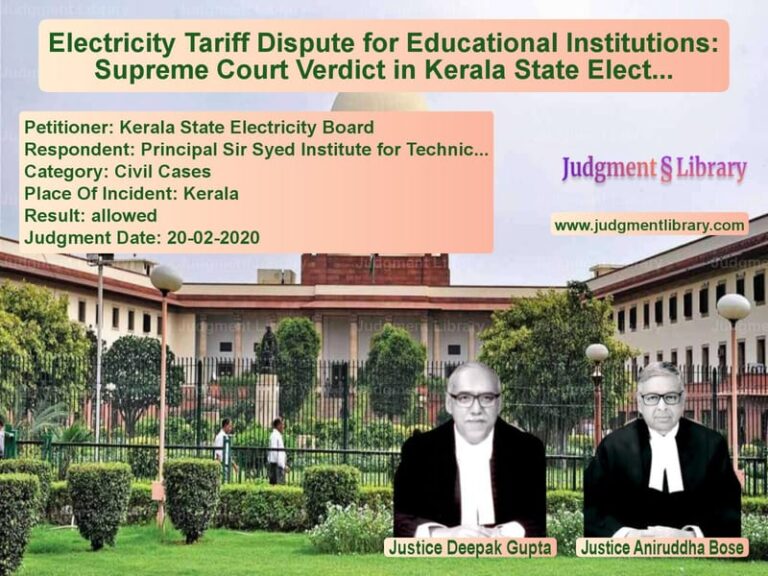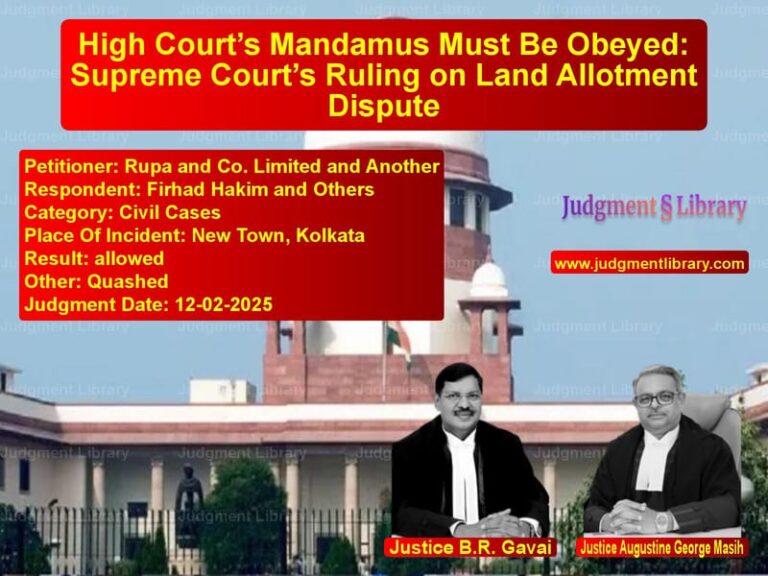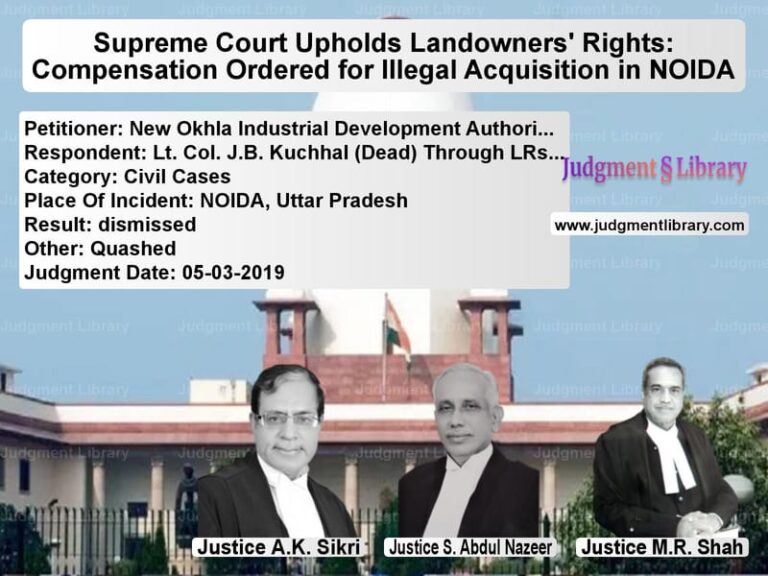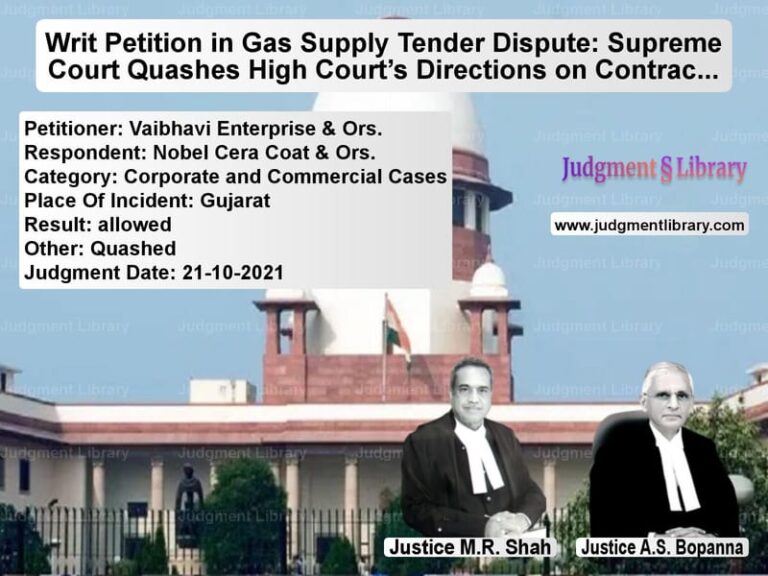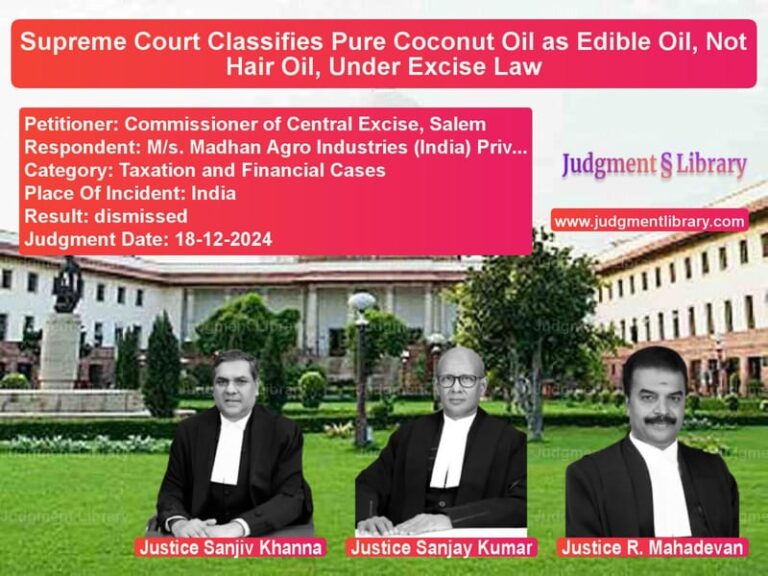Government Procurement of Ayurvedic Medicines: Supreme Court Rules on Tender Process
The case of M/S Indian Medicines Pharmaceuticals Corporation Ltd (IMPCL) vs. Kerala Ayurvedic Co-operative Society Ltd & Ors. centers around the procurement of Ayurvedic medicines by the Uttar Pradesh government. The Supreme Court ruled on whether the state could purchase medicines solely from IMPCL without inviting tenders, a decision that has significant implications for public procurement policies and fair competition.
The National AYUSH Mission (NAM) was launched by the Ministry of AYUSH to promote cost-effective AYUSH services. Under the mission’s Operational Guidelines, at least 50% of the grant-in-aid for purchasing Ayurvedic medicines must be used to procure drugs from IMPCL, public sector undertakings (PSUs), state-run pharmacies, or cooperatives.
The State AYUSH Society of Uttar Pradesh had been purchasing all its Ayurvedic medicines from a single vendor, IMPCL, without inviting tenders. The Kerala Ayurvedic Co-operative Society Ltd. (KACSL), a cooperative society engaged in Ayurvedic medicine manufacturing, challenged this practice, arguing that it violated the principles of fair competition and transparency.
The Lucknow Bench of the High Court of Judicature at Allahabad ruled in favor of KACSL, stating that the state must invite tenders to ensure fair competition. The High Court directed the state to conduct a transparent procurement process. IMPCL and the State of Uttar Pradesh appealed the decision before the Supreme Court.
Key Issues Before the Supreme Court
- Whether the state was justified in procuring Ayurvedic medicines solely from IMPCL without issuing tenders.
- Whether paragraph 4(vi)(b) of the Operational Guidelines allowed such exclusive procurement.
- Whether government contracts, even those not involving revenue maximization, must adhere to transparency principles.
Arguments of the Parties
Petitioner’s Arguments (IMPCL and Uttar Pradesh Government)
- IMPCL, being a government-owned entity, ensures high-quality medicines at affordable prices.
- The Union Ministry of Finance vets the prices of medicines manufactured by IMPCL, making the procurement cost-effective.
- The Ministry of AYUSH has recommended the direct purchase of medicines from IMPCL.
- The procurement of Ayurvedic medicines through tenders is impractical due to variations in raw material prices and the difficulty of quality testing.
- Public tendering is not a constitutional requirement in all cases; deviation is allowed in special circumstances.
Respondent’s Arguments (Kerala Ayurvedic Co-operative Society Ltd.)
- All eligible suppliers mentioned in paragraph 4(vi)(b) of the Operational Guidelines should be given an equal opportunity.
- The state’s preference for IMPCL was arbitrary and violated the principle of fair competition under Article 14 of the Constitution.
- Past government circulars favoring IMPCL were superseded by a 2019 notification from the Ministry of AYUSH, which allowed procurement from multiple sources.
- Competitive bidding would ensure quality assurance and cost-effectiveness.
- The Ministry of Finance does not have the expertise to determine Ayurvedic medicine prices.
Supreme Court’s Judgment
The Supreme Court ruled against the exclusive procurement of Ayurvedic medicines from IMPCL. The key takeaways from the judgment are:
1. Government Procurement Must Be Fair and Transparent
- The government must act fairly and transparently while awarding contracts.
- The state cannot arbitrarily prefer one supplier over others when multiple eligible entities exist.
2. No Exclusive Monopoly for IMPCL
- The Supreme Court rejected the argument that IMPCL should have a monopoly over government procurement.
- The court noted that paragraph 4(vi)(b) lists multiple eligible suppliers, not just IMPCL.
- The term “at least” in the provision sets a minimum benchmark but does not prohibit competition.
3. Tendering Process is Necessary
- The state must invite tenders when procuring Ayurvedic medicines.
- The court held that “a transparent process such as tenders ensures fair competition and accountability.”
4. Special Circumstances Must Be Justified
- If the government wishes to deviate from the tender process, it must provide cogent reasons and demonstrate the existence of exceptional circumstances.
- The court rejected the claim that IMPCL is the only manufacturer producing quality Ayurvedic medicines.
Key Observations from the Judgment
The Supreme Court made several important observations:
- “The State does not have absolute discretion while spending public money. All government actions, including contracts, must be tested on the touchstone of Article 14.”
- “There is no material on record to support the submission that IMPCL is the only establishment manufacturing good quality Ayurvedic medicines.”
- “Merely because IMPCL is a government entity does not mean that commercial interests do not influence its operations.”
- “Deviating from the tender process is permissible only in exceptional situations, which must be supported by substantive justification.”
Final Decision
The Supreme Court dismissed the appeal filed by IMPCL and the Uttar Pradesh government, upholding the High Court’s ruling that procurement must be conducted through a fair and transparent process.
Impact of the Judgment
This ruling sets a strong precedent for government procurement policies. The decision:
- Ensures that government contracts are awarded through competitive bidding.
- Prevents monopolies and favoritism in public procurement.
- Encourages transparency and accountability in the allocation of public funds.
- Promotes fair competition among eligible suppliers.
The ruling reinforces that public procurement must align with constitutional principles of fairness, equality, and non-arbitrariness, safeguarding the interests of multiple stakeholders in the industry.
Petitioner Name: M/S Indian Medicines Pharmaceuticals Corporation Ltd.Respondent Name: Kerala Ayurvedic Co-operative Society Ltd. & Ors..Judgment By: Justice Dhananjaya Y Chandrachud, Justice Hima Kohli.Place Of Incident: Uttar Pradesh.Judgment Date: 03-01-2023.
Don’t miss out on the full details! Download the complete judgment in PDF format below and gain valuable insights instantly!
Download Judgment: ms-indian-medicines-vs-kerala-ayurvedic-co-supreme-court-of-india-judgment-dated-03-01-2023.pdf
Directly Download Judgment: Directly download this Judgment
See all petitions in Contract Disputes
See all petitions in Judgment by Dhananjaya Y Chandrachud
See all petitions in Judgment by Hima Kohli
See all petitions in dismissed
See all petitions in Quashed
See all petitions in supreme court of India judgments January 2023
See all petitions in 2023 judgments
See all posts in Civil Cases Category
See all allowed petitions in Civil Cases Category
See all Dismissed petitions in Civil Cases Category
See all partially allowed petitions in Civil Cases Category


